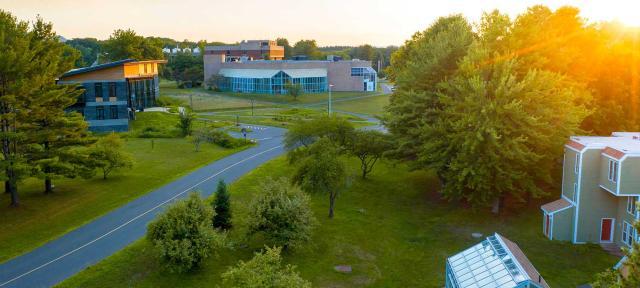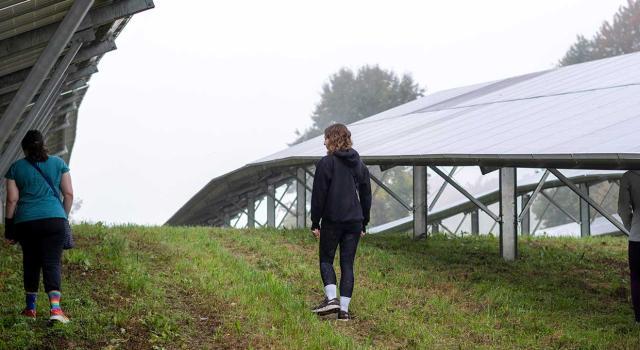Hampshire College Achieves Carbon Neutrality

Hampshire College announced today that it has achieved its 2022 goal of carbon neutrality for all campus emissions, including electricity and natural gas heating.
Additionally, the College met its 2032 goal of full carbon neutrality which includes offsets to indirect emissions like commuting and waste, ten years ahead of schedule thanks to a strong energy portfolio and careful leveraging of college land, leadership, and infrastructure.
“Hampshire’s commitment to carbon neutrality is directly related to our students’ learning experience and aligned with our core values,” says President Ed Wingenbach. “Our curriculum is organized around the urgent challenges of our time, one of which is ‘How should we act on our responsibilities in the face of the changing climate?’”
Hampshire’s vision for sustainability is built upon the strengths of the College — fostering innovation, holistic systems thinking, modeling sustainable practices, and preparing students to lead in creating a more just world. Hampshire’s path to carbon neutrality reflects this tradition, combining several sustainable energy strategies to create a resilient energy portfolio:
- Hampshire hosts two large solar fields on its property to increase the amount of renewable energy on the grid and help Massachusetts meet its renewable energy goals. These fields contribute over 4 million kWh of renewable energy to the grid every year. Hampshire does not directly use the renewable energy from these solar fields, but rather purchases renewable wind and solar energy credits equal to 100 percent of the College’s annual energy use.
- College-owned solar arrays on the net zero including the R.W. Kern Center, the CSA Barn, and the President’s House contribute additional solar energy to the grid and provide Hampshire with low fixed-cost electricity.
- Hampshire’s participation in the New England College Renewable Partnership (NECRP), a first-of-its-kind collaboration with Amherst, Bowdoin, Smith, and Williams Colleges, allows the College to purchase additional off-site renewable electricity at a fixed price for the next 20 years.
- Hampshire mitigates remaining carbon emissions through carbon offsets, some of which are funded through the sale of high value renewable energy credits (RECs) produced by the NECRP.
"It's both impressive and encouraging that a small college in the hills of western New England can achieve carbon neutrality,” says former Hampshire College President Jonathan Lash. “It proves what can be achieved through vision and collaboration." The College set its carbon neutrality goal in 2012 during Lash’s tenure.
Sustainability at Hampshire College
Achieving carbon neutrality is just the latest success in Hampshire’s long commitment to sustainability and combating climate change. Hampshire was one of the first colleges to divest from fossil fuels, in December of 2011. In 2016, the college opened the R.W. Kern Center, a net-zero Living Building that models holistic sustainable building practices and has been the foundation for several student and faculty research projects. Recent work by Hampshire graduate Flynn Hibbs on the impact of solar development on wildlife is informing discussions of solar policy in Amherst. And the Hampshire College Farm continues to provide locally grown produce, eggs, and meat to students and the wider community through our CSA program.
Read more about Hampshire College’s Path to Carbon Neutrality here.



